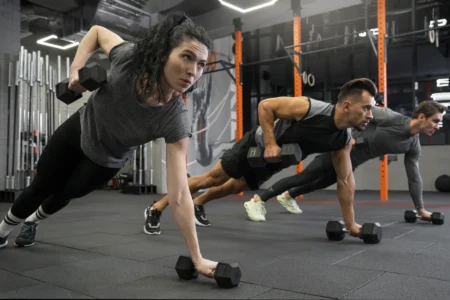 Fitness isn’t just about chasing a perfect body. It’s about how you feel when you wake up, how much energy you carry through the day, and how grounded you feel in your own skin. You notice the difference the moment you start moving more. Your breath gets deeper. Your mind feels clearer. Your body stops feeling like a burden and starts feeling like a partner.
Fitness isn’t just about chasing a perfect body. It’s about how you feel when you wake up, how much energy you carry through the day, and how grounded you feel in your own skin. You notice the difference the moment you start moving more. Your breath gets deeper. Your mind feels clearer. Your body stops feeling like a burden and starts feeling like a partner.
That’s why people keep coming back to fitness, even after long breaks. It gives something real in return. Not pressure. Not perfection. Just a sense that you’re more alive than you were yesterday.
When Movement Starts Changing You
At first, working out feels awkward. Your muscles complain. Your breath gets choppy. You doubt whether you’re doing anything right. But your body adapts fast. Even small routines change the way you stand, walk and think.
You notice your mood lifting on days you move. You notice stress hitting you softer. You notice sleep becoming deeper. And you start craving that feeling—of shaking off tension, of feeling stronger than you expected, of trusting your own endurance.
Fitness has this quiet way of reminding you that you’re capable of more than the tired version of you believes.
Why Consistency Beats Intensity
People often think they need a huge commitment to get results. However, your body responds better to small, steady steps. A 20-minute walk every day does more for you than one brutal workout once a week. Consistency teaches your muscles, your heart and your brain to expect movement.
On the other hand, when you chase intensity without a base, you burn out. You get sore, frustrated, and tempted to quit. But when you build slowly—adding a few minutes, a bit of weight, a new exercise—you grow stronger without forcing anything. The process becomes sustainable instead of painful.
The Mind-Body Connection
Movement changes your brain. That’s not a metaphor. When you exercise, your body releases chemicals that help regulate mood and soften anxiety. You think clearer after a workout because your mind gets actual space to breathe.
Still, the benefits aren’t only chemical. Fitness gives you proof that you can do hard things and come out okay. You lift something heavy, push through a set, hold a plank longer than before—and suddenly a stressful day feels less intimidating. It’s not about the reps. It’s about learning that discomfort doesn’t have to scare you.
Finding the Style That Fits
You don’t need a gym membership or fancy gear to get fit. The key is choosing something you genuinely enjoy. Some people like the rhythm of running. Others prefer strength training because it feels empowering. Some love slow, controlled work like Pilates, while others thrive in fast, sweaty sessions that feel like a release.
Try different things. Listen to your body. If you dread a certain type of workout, it’s not the right one for you. When movement feels good—even when it’s challenging—you stick with it naturally. That’s the goal.
The Social Side of Fitness
Working out can feel lonely when you’re doing it in silence. However, the moment you join a class, train with a friend or meet people who share the same goals, something shifts. You feel supported. You feel accountable. You feel connected.
Humans aren’t built to do everything alone. Fitness becomes easier when someone encourages you, laughs with you when you struggle, and shows up even on days when motivation is low. A supportive environment keeps you going more than willpower ever will.
Moving Toward a Stronger Life
You don’t need to transform your entire routine overnight. Start small. Stretch in the morning. Walk after meals. Do a few bodyweight exercises at home. Give yourself permission to begin where you are.
Fitness isn’t a punishment. It’s not about earning your meals or fixing your flaws. It’s a way to build strength, resilience, confidence and mental clarity. It’s a practice that makes the rest of your life feel less heavy and more flexible.
When you show up for your body, your body shows up for you. And little by little, movement stops being a task and starts being a part of who you are.
Picture Credit: Freepik
